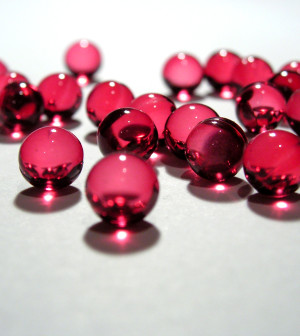- Could Your Grocery Store Meat Be Causing Recurring UTIs?
- Are You Making This Expensive Thermostat Error This Winter?
- Recognizing the Signs of Hypothyroidism
- 10 Strategies to Overcome Insomnia
- Could Artificial Sweeteners Be Aging the Brain Faster?
- Techniques for Soothing Your Nervous System
- Does the Water in Your House Smell Funny? Here’s Why
- Can a Daily Dose of Apple Cider Vinegar Actually Aid Weight Loss?
- 6 Health Beverages That Can Actually Spike Your Blood Sugar
- Treatment Options for Social Anxiety Disorder
Iron Supplements May Help Blood Donors Recover More Quickly


Low-dose iron supplements speed blood donors’ recovery of iron and hemoglobin, an iron-rich protein that carries oxygen in red blood cells, new research shows.
“This study highlights the importance of maintaining iron levels after blood donation, and shows that supplemental iron effectively restores hemoglobin, even in donors with higher iron levels,” according to principal investigator Dr. Joseph Kiss, medical director of the Institute for Transfusion Medicine at the University of Pittsburgh.
The study included 215 adult blood donors at four blood donation centers in the United States.
Blood donors are allowed to give one pint of blood every eight weeks, but about 25 percent to 35 percent of donors develop iron deficiency. This can lead to fatigue and anemia, and make people temporarily ineligible to donate blood, the study authors pointed out in a news release from the U.S. National Heart, Lung, and Blood Institute (NHLBI).
In the study, the participants were divided into two groups — those with higher iron levels and those with lower iron levels. In each of those groups, half of the participants took low-dose iron supplements (38 milligrams) daily for 24 weeks after donating blood, while others took no iron supplements.
Compared to those who didn’t take supplements, participants who took supplements returned to pre-donation hemoglobin levels much faster in both the lower iron group (5 weeks versus 23 weeks) and the higher iron group (4 weeks versus 11 weeks), the study found.
Donors who took iron supplements also recovered lost iron sooner than those who did not take supplements: 11 weeks versus more than 24 weeks. After 24 weeks, two-thirds of the participants who did not take supplements had not recovered the iron lost from donating blood, the investigators noted.
The NHLBI-funded study was published Feb. 10 in the Journal of the American Medical Association.
“This research brings us another step closer to understanding how to maintain healthy iron levels in blood donors. Maintaining healthy iron levels will allow donors to safely continue donating, thereby ensuring a robust blood supply for patients in need,” Dr. Simone Glynn, chief of the Blood Epidemiology and Clinical Therapeutics Branch at NHLBI, said in the news release.
More information
The American Red Cross has more about blood donation.
Source: HealthDay
Copyright © 2026 HealthDay. All rights reserved.










